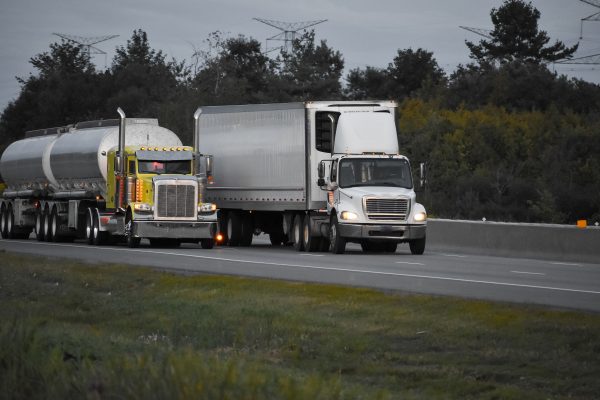June 28 is National Insurance Awareness Day, a perfect time to think about how important insurance is for keeping fleets safe and running smoothly. It’s easy to see insurance as just another cost, but it’s actually a key part of managing a fleet.
In 2022, there were over 166,000 accidents involving large trucks in the U.S., leading to over 5,000 deaths and 72,000 injuries.
These numbers show how risky it can be to operate a fleet and why good insurance is essential. Vehicle theft is also a big problem, with more than 1 million vehicles stolen in the U.S. in 2022, the highest rate in 15 years.
For fleet managers, having the right insurance policy isn’t just about following the law—it’s about protecting your business from huge financial losses.
Insurance helps cover the costs of accidents, theft, and other unexpected events. Since fleets move 72.5% of America’s freight by weight, having strong insurance is crucial to keeping things running smoothly.
National Insurance Awareness Day is a great reminder to review your insurance policies. Understanding how important insurance is can help fleet operators protect their investments and keep their operations running, no matter what happens.
Understanding the Importance of Fleet Insurance
Overview of Fleet Insurance
Fleet insurance is designed to cover multiple vehicles under one policy, simplifying the management and protection of all your fleet assets. It includes several key components:
- Liability Insurance: Covers damages if your fleet vehicle is involved in an accident that causes injury or damage to someone else’s property.
- Collision Insurance: Pays for damage to your vehicles if they collide with another object or vehicle.
- Comprehensive Insurance: Covers non-collision-related incidents, such as theft, vandalism, or natural disasters.
Legal Requirements
Insurance requirements can vary, but almost all regions mandate at least some form of liability insurance for fleets. For example:
- United States: Federal law requires commercial vehicles to have a minimum of $750,000 in liability insurance for interstate travel, though higher limits are common depending on the type of cargo.
- Canada: Most provinces require commercial vehicles to carry at least $1 million in liability insurance.
Risk Management
Comprehensive insurance plays a crucial role in risk management for fleets. Here’s why:
- Accidents: With over 166,000 large truck accidents in the U.S. in 2022, having collision and liability insurance is essential to cover repairs and legal costs.
- Theft: Vehicle theft is a growing problem, with more than 1 million vehicles stolen in 2022 in the U.S.. Comprehensive insurance helps recover the costs of stolen vehicles.
- Natural Disasters: Weather events can cause significant damage to fleets. Comprehensive insurance can cover these damages, ensuring your fleet gets back on the road quickly.
In short, fleet insurance isn’t just about meeting legal requirements—it’s about protecting your investments and ensuring your business can handle unexpected challenges. By understanding and optimizing your fleet insurance, you can better manage risks and keep your operations running smoothly.
Common Challenges in Fleet Insurance
High Premiums
One of the biggest challenges fleet operators face is the rising cost of insurance premiums. Insurance premiums for fleets can be high due to several factors:
- Accident Rates: With over 166,000 accidents involving large trucks in the U.S. in 2022, insurers often raise premiums to cover potential payouts.
- Theft Rates: The increase in vehicle theft, with more than 1 million vehicles stolen in 2022, also contributes to higher insurance costs.
- Operational Costs: General inflation and rising costs of repairs and replacements make insuring fleets more expensive.
High premiums can significantly impact a fleet’s operating budget, making it essential for operators to find ways to manage and reduce these costs.
Claims Process
Filing insurance claims can be a complex and time-consuming process. Fleet operators often face several challenges when dealing with claims:
- Documentation: Gathering all necessary documents and evidence can be a daunting task, especially after an accident.
- Processing Time: Insurance companies can take a long time to process claims, leading to delays in payouts.
- Disputes: There can be disagreements over the extent of coverage or the amount to be paid out, which can further delay the resolution of claims.
These complexities can strain fleet operations, as vehicles might be out of service while waiting for claims to be settled.
Coverage Gaps
Many fleet operators may overlook certain areas in their insurance coverage, leading to gaps that can be costly in the event of an incident. Common coverage gaps include:
- Non-Owned Vehicle Coverage: This covers vehicles not owned by the company but used for business purposes. For example, a company employee using their personal vehicle for a delivery could be involved in an accident, leaving the company liable for damages if this coverage isn’t in place.
- Uninsured/Underinsured Motorist Coverage: If an accident involves a driver with insufficient insurance, this coverage ensures that your fleet is still protected.
- Cargo Insurance: While liability and collision insurance cover the vehicle, they often don’t cover the cargo being transported. Cargo insurance is essential for protecting the goods being delivered.
Identifying and addressing these coverage gaps can help fleet operators avoid unexpected expenses and ensure comprehensive protection for their operations.
By understanding and addressing these common challenges, fleet operators can better navigate the complexities of insurance and ensure their fleets are adequately protected.
Tips for Fleet Operators on National Insurance Awareness Day
Regular Policy Reviews
One of the best ways to ensure your fleet is adequately protected is to regularly review your insurance policies. Policies should be revisited at least once a year, or whenever there are significant changes in your fleet operations. Here’s why:
- Stay Updated: Insurance needs can change over time due to factors like fleet expansion, new routes, or changes in regulations. Regular reviews help keep your coverage up-to-date.
- Identify Gaps: Regular reviews can help you spot any gaps in coverage, ensuring that all aspects of your fleet operations are protected.
- Optimize Costs: Reviewing policies can also help identify areas where you might be overpaying and allow you to adjust coverage to better suit your current needs.
Implement Safety Programs
Establishing comprehensive driver safety programs is crucial for lowering insurance risks and premiums. Safe driving not only protects your fleet but can also lead to significant savings on insurance. Here’s how to get started:
- Training and Education: Regular training sessions for drivers on safe driving practices and defensive driving techniques can reduce accident rates.
- Incentive Programs: Implementing rewards and recognition for safe driving behaviors can motivate drivers to adhere to safety protocols.
- Monitoring and Feedback: Using technology to monitor driving behavior and provide real-time feedback can help drivers improve their habits.
According to the Federal Motor Carrier Safety Administration (FMCSA), incorporating safety programs can lead to a reduction in accidents and associated costs.
Leverage Technology
Integrating telematics and fleet management solutions can significantly improve your insurance outcomes. These technologies provide valuable data that can be used to enhance safety, efficiency, and insurance claims processes:
- Telematics: Using telematics systems to track vehicle location, speed, and driver behavior can help in preventing accidents and improving response times in case of incidents. Studies have shown that fleets using telematics experience fewer accidents and lower insurance premiums.
- Dash Cams: Installing dash cams in fleet vehicles can provide clear evidence in case of accidents, helping to resolve claims faster and more accurately.
- Fleet Management Software: Comprehensive fleet management software can help monitor vehicle maintenance schedules, reducing the risk of breakdowns and accidents.
National Insurance Awareness Day is the perfect time to implement these tips and ensure your fleet is fully protected and operating efficiently.



